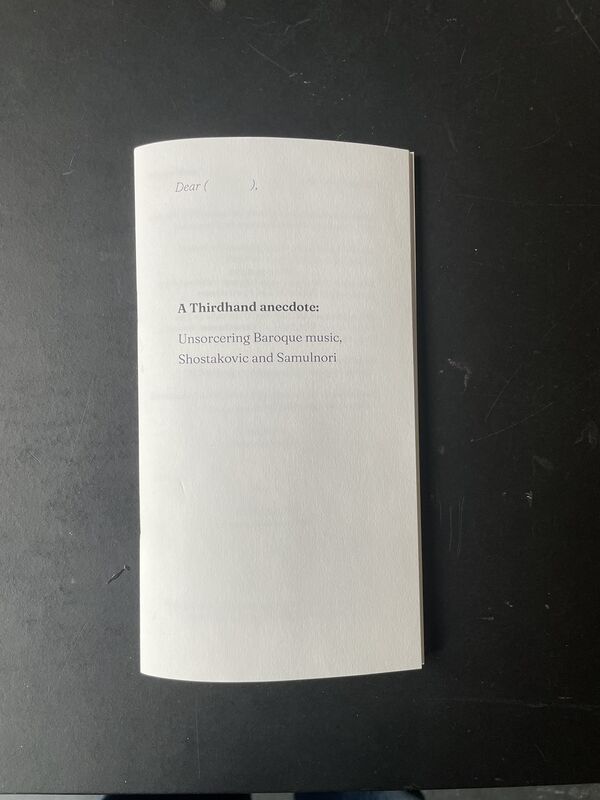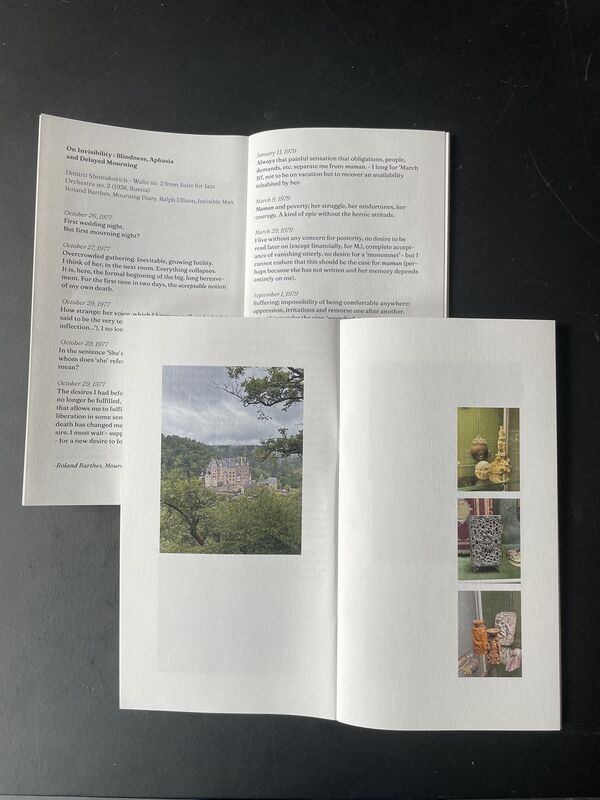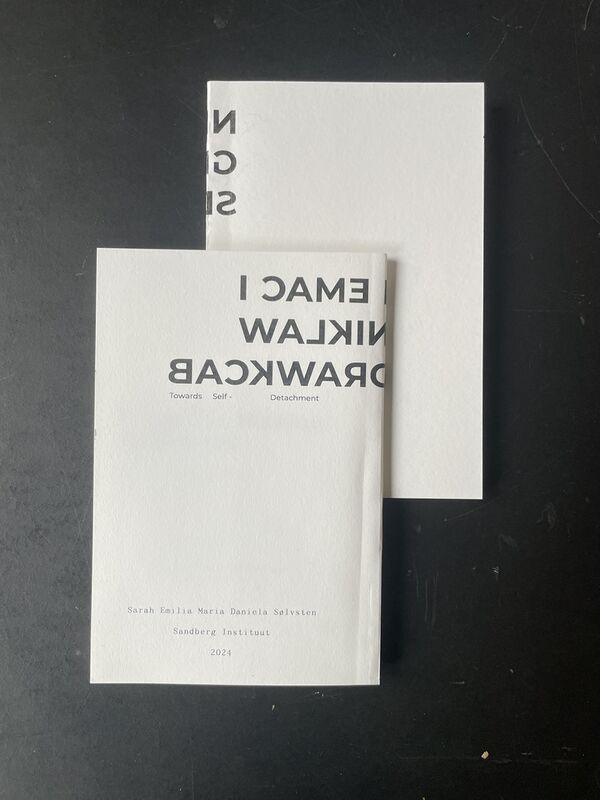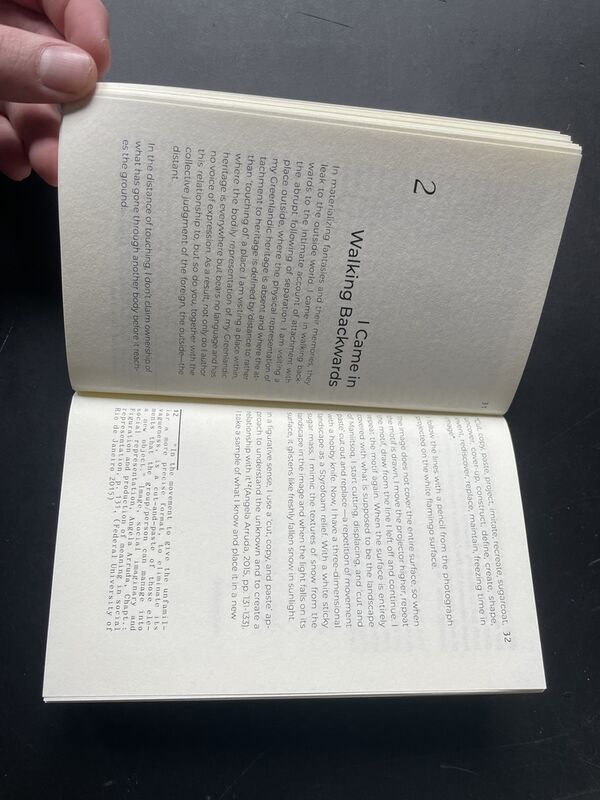User:ØverLørd/somebookdesign: Difference between revisions
(even more text added) |
(added text fro I came in walking backwards) |
||
| (One intermediate revision by the same user not shown) | |||
| Line 1: | Line 1: | ||
<div style="max-width:80ch; margin:auto;"> | |||
'''In my practice I have helped various artists realize their visions of publications and printed matter. Working with these small edition and very situated publications is a great space for exploring, experimenting and interrogating form/content of such matters.''' | '''In my practice I have helped various artists realize their visions of publications and printed matter. Working with these small edition and very situated publications is a great space for exploring, experimenting and interrogating form/content of such matters.''' | ||
<br> | <br> | ||
| Line 4: | Line 6: | ||
<br> | <br> | ||
This publication was made in collaboration with Su, who is a first year student at the Fine Arts department of the PZI. The publication was given to the participants at a performance showcasing SU's practice. It is a collection of photos, text excerpts, as well as a dinner menu (for a dinner that was related to the performance), as well as titles of music pieces performed. | This publication was made in collaboration with Su, who is a first year student at the Fine Arts department of the PZI. The publication was given to the participants at a performance showcasing SU's practice. It is a collection of photos, text excerpts, as well as a dinner menu (for a dinner that was related to the performance), as well as titles of music pieces performed. | ||
<br> | <br><br> | ||
[[File:Research-1.jpg|600px]] | [[File:Research-1.jpg|600px]] | ||
<br style="clear:both;"> | <br style="clear:both;"> | ||
| Line 10: | Line 12: | ||
<br> | <br> | ||
The initial draft for the publication was made based on conversations regarding the artist's practice and the performance. This draft was then revised together with the artist before the design was finalized. the publications were printed using the office-printers and then bound and cut in the publication station. | The initial draft for the publication was made based on conversations regarding the artist's practice and the performance. This draft was then revised together with the artist before the design was finalized. the publications were printed using the office-printers and then bound and cut in the publication station. | ||
<br> | <br><br> | ||
[[File:Research-2.jpg|600px]] | [[File:Research-2.jpg|600px]] | ||
<br style="clear:both;"> | <br style="clear:both;"> | ||
| Line 17: | Line 19: | ||
A challenge in the designing of this publication was that it wanted to contain a lot of different elements: The Songs, The dinner-menu, a lot of excerpts and even more photos. Central to the artists practice are memories, thus the publication takes the form of a scrap-book. In order to room all the images it was important to give them a lot of room. As some wise-person once said "Typography is concerned with designing the white space between text". This way the contents is more free to be in dialogue with itself | A challenge in the designing of this publication was that it wanted to contain a lot of different elements: The Songs, The dinner-menu, a lot of excerpts and even more photos. Central to the artists practice are memories, thus the publication takes the form of a scrap-book. In order to room all the images it was important to give them a lot of room. As some wise-person once said "Typography is concerned with designing the white space between text". This way the contents is more free to be in dialogue with itself | ||
<br> | <br> | ||
==I came in walking backwards== | |||
<br> | |||
This publication was created in collaboration with Emilia Sølvsten, a fine arts student at Sandberg Institute. The publication contains their thesis, and was intended for archival purposes. Printed on Ofiice-printers then bound with glue-binder and cut at the WDKA publication station. | |||
<br><br> | |||
[[File:Research-3.jpg|600px]] | [[File:Research-3.jpg|600px]] | ||
<br style="clear:both;"> | <br style="clear:both;"> | ||
<small></small> | <small></small> | ||
<br> | |||
The thesis is concerned with re-conecting with ones heritage, as the artist is Danish with Greenlandic family. As the title suggest there is a notion of this re-connecting is not a linear process where you just trace backwards or whatever. In conversations with the artist it was apparent that they wanted to substantiate this non-linearity in the from of the publication. | |||
<br><br> | |||
[[File:Research-4.jpg|600px]] | [[File:Research-4.jpg|600px]] | ||
<br style="clear:both;"> | <br style="clear:both;"> | ||
<small></small> | <small></small> | ||
<br> | |||
To challenge the regular linear approach of conventional books, it may seem like an idea to set the book backwards. Though this does not actually affect the rythm of the reading, but rather conforms to another paradigm of right to left, rather than left to right. Therefore this publication is set backwards in the sense that the spreads appear from back to front, but each spread is set from left to right. This creates a more choppy reading rhythm where the reader is forced to navigate back (through spreads) and forth (In the spreads), confronting the conventional approaches to book-narratives. | |||
<br><br> | |||
</div> | |||
Latest revision as of 17:06, 2 April 2024
In my practice I have helped various artists realize their visions of publications and printed matter. Working with these small edition and very situated publications is a great space for exploring, experimenting and interrogating form/content of such matters.
A Thirdhand Anecdote
This publication was made in collaboration with Su, who is a first year student at the Fine Arts department of the PZI. The publication was given to the participants at a performance showcasing SU's practice. It is a collection of photos, text excerpts, as well as a dinner menu (for a dinner that was related to the performance), as well as titles of music pieces performed.

Cover of "A Thirdhand anecdote: Unsorcering Baroque music, Shostakovic and Samulnori"
The initial draft for the publication was made based on conversations regarding the artist's practice and the performance. This draft was then revised together with the artist before the design was finalized. the publications were printed using the office-printers and then bound and cut in the publication station.

two spreads shocasing the layout of the publication
A challenge in the designing of this publication was that it wanted to contain a lot of different elements: The Songs, The dinner-menu, a lot of excerpts and even more photos. Central to the artists practice are memories, thus the publication takes the form of a scrap-book. In order to room all the images it was important to give them a lot of room. As some wise-person once said "Typography is concerned with designing the white space between text". This way the contents is more free to be in dialogue with itself
I came in walking backwards
This publication was created in collaboration with Emilia Sølvsten, a fine arts student at Sandberg Institute. The publication contains their thesis, and was intended for archival purposes. Printed on Ofiice-printers then bound with glue-binder and cut at the WDKA publication station.

The thesis is concerned with re-conecting with ones heritage, as the artist is Danish with Greenlandic family. As the title suggest there is a notion of this re-connecting is not a linear process where you just trace backwards or whatever. In conversations with the artist it was apparent that they wanted to substantiate this non-linearity in the from of the publication.

To challenge the regular linear approach of conventional books, it may seem like an idea to set the book backwards. Though this does not actually affect the rythm of the reading, but rather conforms to another paradigm of right to left, rather than left to right. Therefore this publication is set backwards in the sense that the spreads appear from back to front, but each spread is set from left to right. This creates a more choppy reading rhythm where the reader is forced to navigate back (through spreads) and forth (In the spreads), confronting the conventional approaches to book-narratives.
